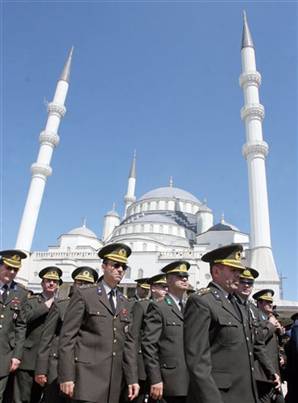
By Richard Norman
I recently returned from a trip to Istanbul where I participated in an eight-day post-conflict simulation meant to certify the NATO rapid deployment corp based there. The training audience was largely Turkish, and the cell I worked with was responsible for putting pressure on the corp’s communications office. Press conferences, scrums, and aggressive journalists were largely new ideas to them–there is almost no room for flexibility or spontaneity in the highly centralized Turkish military-media relations. I thought I’d sketch out in this post some of the differences between how the Turkish military (even under the auspices of NATO) deals with media compared to its more western partners. The Turkish military likes to say that it guarantees the secular nature of the republic founded by Ataturk. As recently as six months ago, the top general waded into the presidential contest and put the kibosh on a religious moderate’s candidacy.
[In the middle of the campaign] the Web site of the general staff carried a statement attacking the proponents of "a reactionary mindset whose sole aim is to erode the fundamentals of our state," and vowing that the armed forces would, "if necessary, act…in a clear and unambiguous manner." This was interpreted as a sign that a coup against Erdogan’s government was in the offing. A few days later, the Constitutional Court ruled that a quorum of 367 deputies had to be present in parliament for any vote on a new president to proceed. Because the CHP deputies duly failed to turn up, the number in attendance fell just below the court’s threshold, and Erdogan was forced to withdraw Gül’s candidacy. [NYRB]
In the face of this interference and widespread popular opposition, the prime minister, Recep Tayyip Erdogan, felt compelled to go to the polls to affirm his government’s popular support and Abdullah Gül’s candidacy. Following a landslide victory in August for Erdogan’s party, the military and secularists were forced to accept Gül as president The special role of the military in the politics of Turkey goes a long way to explaining its taciturn relationship with the media. Although all of the high-ranking Turkish officers I met were adept at dealing with questions from international journalists and conducted themselves well during press conferences, I suspect their education in media and their attitude to it has largely been engendered by stints at SHAPE headquarters in Belgium or through participation in NATO exchanges. When it comes to domestic media, things are different. Two examples In the last year illustrate the opaque and authoritarian behaviour the military shows toward domestic media. First, in March, Turkish media reported the military had "blacklisted" (refused accreditation to) journalists it considered to be "anti-military." This drew widespread outrage, though it seemed a policy very much in line with the implicit and explicit censorship of issues relating to Turkey’s Kurds and the former Armenian population. Second, last month, the army unilaterally banned media reports on the investigation into the eight soldiers captured and later released by Kurds in northern Iraq. The ban elicited a condemnation from Reporters without Borders. One of the questions the post-conflict simulation (not a war-game) sought to answer was how would the Turkish military, if part of an international mission, behave toward media? A western journalist in a third country cannot be threatened with prosecution for bringing up sensitive issues or steadfastly taking a critical line. Under pressure, would the Turks look like bullies? Or would they be able to conform to Western military-media norms? Without going into great detail about their performance, the Turk’s demonstrated during the simulation a willingness to be open, if not a talent for transparency. The largest problems were ones of training and communication–not authoritarianism or ideology. Internationally experienced officers excelled at sticking to the mission-message and providing necessary information in a timely fashion–aka doing their jobs–while officers with little international experience naturally performed provincially. The Turkish military’s relationship with domestic media may be heavy-handed, but a rationale (whether justified or not) exists for it. Two versions of Turkey live uneasily in the same country–one secular and one religious–with a fine and unnatural balance between them. The military is guarantor of stability. But as the country considers a larger role in NATO’s Afghanistan mission and other future international missions, it is the responsibility not just of NATO, but of leading Turkish generals, to ensure Turkish forces can explain themselves to the world media in a transparent and considered way. Crafting different messages for domestic and international audiences is nothing new for the public information officers of Western armies, but it will be most challenging for Turkey should it decide to step properly onto the world stage. – Richard

The media around the world is not treated like they are in the usa